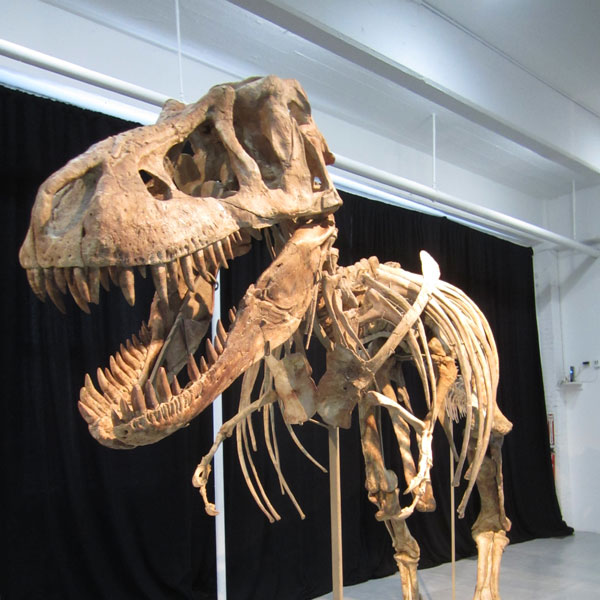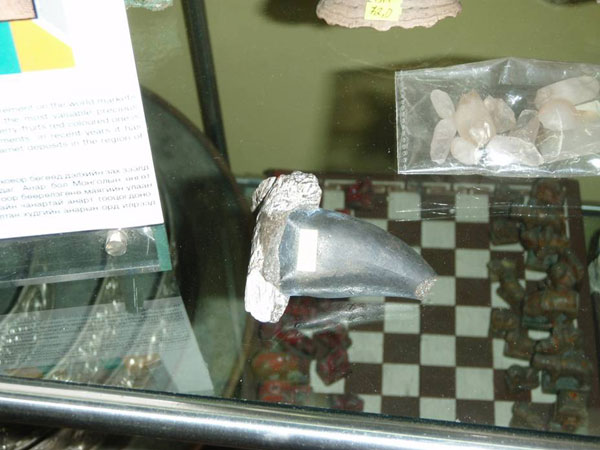Fossil Dealer Seeks to End Disputed Dinosaur Case

The Mongolian government has no claim on a fossilized tyrannosaur skeleton at the center of an international ownership dispute, say attorneys for the Florida fossil dealer who wants the specimen back.
Fossil dealer Eric Prokopi's attorneys are seeking to have a federal attempt to seize the dinosaur dismissed by questioning the legal basis for the case, in both U.S. and Mongolian law.
Paleontologists have supported Mongolian President Tsakhia Elbegdorj's claim on the fossils, saying that clearly identifiable fossils from this species, an Asian relative of the North Ameican T. rex, have been found in only one rock formation within Mongolia.
Combine this probable origin with Mongolian law making its fossils government property, and you have the basis for the case that the dinosaur should go to Mongolia. [See Photos of Seized Tyrannosaur Skeleton]
The Manhattan U.S. Attorney is seeking to seize the 75-percent-complete dinosaur on behalf of Mongolia, making the legal argument that Prokopi imported it knowing it was stolen and provided a false description of it on customs forms.
Prokopi's attorneys, Peter Tompa and Michael McCullough, say the U.S. Attorney does not have a legal basis to seize the fossils. What's more, they argue, there is no conclusive evidence the fossils came out of the ground in Mongolia about 10 years ago, as paleontologists have said. They also argue that Mongolian law does not clearly declare all fossils state property.
Separately from their formal attempt to end the case, Tompa and McCullough released a photo showing what appears to be a fossilized dinosaur tooth. This photo, they said, undercuts the Mongolian claim on the dinosaur because it shows a fossil from the same species of dinosaur, a Tarbosaurus bataar, on sale for tourists in a Mongolian-run museum. (Mongolian law does not allow private ownership of its fossils, so they cannot be sold legally within the country.)
Sign up for the Live Science daily newsletter now
Get the world’s most fascinating discoveries delivered straight to your inbox.
"If it is illegal to sell fossils in Mongolia, then why are fossils being sold in the Natural History Museum? We plan to introduce the photograph, along with other evidence, as this case goes forward," McCullough told LiveScience in an email.
However, as of yet, they have not revealed who took the photo or provided a sworn statement verifying what it shows and other details that would allow the photo to be entered as evidence in the case.

In response, the Mongolian government has conducted an investigation, said Robert Painter, attorney for President Elbegdorj.
The Mongolian government maintains that its law is clear when it comes to the state ownership of fossils, and that it has a history of enforcing its laws. According to information Painter provided, official Mongolia records going back to 2003 show at least several seizures of fossils nearly every year, ranging from an ancient mammal knuckle bone to dinosaur eggs, petrified trees and entire animal skeletons.
As for the alleged sale of a fossil in the museum, the museum leases the space for souvenir shops to private retailers, and museum curators have said that no tenant in those spaces has sold fossils, according to the information Painter provided.
McCullough maintained that the recent Mongolian seizures of fossils were not sufficient evidence to allow the United States to seize the dinosaur and give it to Mongolia. The issue is whether or not Mongolia has an ownership interest in the fossils, which it does not, he said. Mongolia may seek to stop the export of fossils, but the United States does not enforce other countries' export laws without a treaty, which in this case does not exist, he said.
Mongolian officials have also determined that Prokopi visited the country in 2008, 2009 and 2011, Painter said.
An English fossil dealer shipped the Tarbosaurus fossils to Prokopi, who prepared them and then attempted to sell them at auction on May 20. However, President Elbegdorj, with support from paleontologists, attempted to stop the sale, saying the fossils were almost certainly taken illegally from Mongolia. The sale of the fossils, for more than $1 million was put on hold, and in June, the U.S. Attorney for the Southern District of New York filed a civil case to seize the fossils, with the intent of returning them to Mongolia.
Follow Wynne Parry on Twitter @Wynne_Parry or LiveScience @livescience. We're also on Facebook & Google+.










